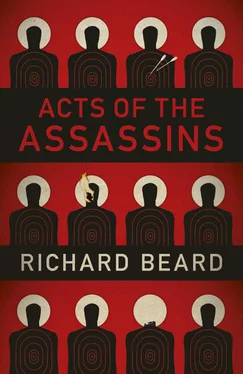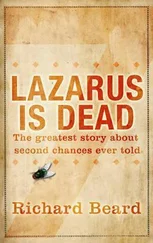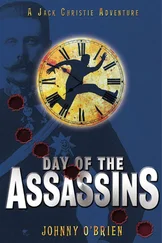Cassius Gallio gets the traffic cops out of bed.
‘Why only a warning?’
‘He was very polite.’
‘You took an address?’
‘We did.’
Gallio calls in Code Orange, and signs out an unmarked Lexus from the motor pool. He hesitates, then calls Baruch on his mobile. If Jesus is dangerous, Gallio needs backup.
Twenty minutes later they’re sitting in the Lexus, no siren, parked with a view of Veronica’s Gift Shop.
‘Networks within networks,’ Baruch says. ‘How the Jesus cult survives. One in all in.’
The shop has a Closed sign in the window. No evidence of the owner or his daughter, but the man who looks like Jesus gave his address as the flat above the shop. Gallio watches the second-floor window. A shadow, moving one way then the other. Baruch fixes a long lens to a camera, puts the window down and aims at the Juliet balcony.
‘You want to make the big announcement we’re here?’
‘I think he knows.’
A figure appears at the window. Jesus. That’s Cassius Gallio’s honest first impression. Jesus has a telephone in one hand and pushes it between his ear and his shoulder as he opens the double window. He stands there talking, enjoying the fresh air, sometimes listening and smiling. Baruch reels off a set of automatic shots. Then he sits back in his seat.
‘Shit,’ he says. He looks at the digital contact sheet. ‘It’s not him, is it?’
‘Run the photos against the database.’
They look at each other, two middle-aged security operatives on a stakeout with no idea how to use the technology. They phone Claudia, wake her up. She talks them through it. They have the camera leads? Yes. Camera to phone, jpegs to her office email. She’ll activate the program. Once the photos are in the database a match will come up within minutes.
‘We knew that,’ Gallio says. ‘But thanks.’
While they wait for the results they tell each other they never expected this Jesus to be Jesus. Statistically, with seven disciples at large, a Jesus sighting now in Jerusalem always looked unlikely.
‘I’m tired.’ Gallio rubs the base of his thumb into an eye. ‘I’ve been up all night. I’m seeing things.’
Claudia texts the results back to the car, and Baruch says in the old days they’d never have believed it: he’d still be unloading film from the camera. Gallio holds his phone towards the centre of the dash where they can both read the screen. The jaywalker staying in the flat above the Veronica shop turns out to be James, the second James, a disciple but not the man himself. Seconds later Claudia texts across the Wikipedia page.
‘Could be worse,’ Gallio says. ‘He’s an original disciple, not a nobody or an impostor.’
‘Are we going to pick him up?’
‘No, I don’t think we are.’
They wait. If James knows they’re watching he doesn’t let that stop him from leaving the building. Early evening, plenty of people on the street. Gallio decides James doesn’t know, and they follow him on foot. He stops a few times to touch this hand or that, well-wishers who recognise his face. Baruch wishes he’d brought his camera, but James is moving again, and he goes into a church in the Armenian quarter. A new church, built since the first James died and dedicated to his memory. Death has not deterred the Armenians.
‘Let’s pick him up,’ Baruch says. ‘What are we waiting for?’
‘We’re not after James. He’s a means to an end.’
In the St James Armenian Cathedral the disciple has a full congregation, and in their rapt attention Gallio sees they couldn’t care less which of the disciples James is, or even which James. For the churchgoers he is an early adopter who has touched the hand of Jesus, and that direct connection is enough. Or more than that, Gallio thinks. In James they see the face of Jesus, and are made glad.
From the pulpit James repeats the stories his listeners mostly know: what Jesus said, what he did. He acts as if the disciples, possibly in Jerusalem after the disappearance of Jesus, held a strategy meeting and decided that a popular story would be enough to keep their movement alive. Good triumphs and evil is vanquished. Why not? Gallio too would like to believe in this.
Like the other disciples James has told and retold the story: a manual worker grows up in a provincial backwater of Israel. I know, Gallio thinks, I know this, I’ve heard it before. Also, the information is in the file. Around the age of thirty Jesus reveals extraordinary powers, including a flair for public speaking that he uses to promote a notion of social justice. He argues for the existence of a single god, a supreme being attentive to individuals, who will reward the virtuous with joyful everlasting life. But only after they die.
There is nothing that James will not do for Jesus, no heartening story he will not tell. James finishes his sermon with the second coming, when Jesus will return from the clouds along with tongues of fire. He will judge the living and the dead.
‘Oh for fuck’s sake,’ Baruch whispers from the back of the church. Heads turn, frowns in place. ‘Let’s pick the fucker up.’
‘No,’ Gallio says. ‘We wait.’
For the first time they have not one but two disciples under observation, James in central Jerusalem and Bartholomew in the Shaare Zedek Medical Center. Cassius Gallio’s strategy is to make Jesus come to them: Jesus didn’t like Gallio interviewing Jude or closing in on Thomas. Now James and Bartholomew in Jerusalem will lure Jesus in. If Valeria is right, and disciples are being killed because they know too much, the killer needs to act before Gallio picks James up, which is what he’d expect Gallio to do.
‘We wait,’ Gallio says, ‘and we watch. James is bait. If Jesus is the killer we trap him when he makes his move. If he isn’t, we catch who we catch. If no one comes for him, then we find out how the disciples keep in touch. We’ll learn more from surveillance than from locking James up in the Antonia.’
‘I can’t just watch people all the time,’ Baruch says.
Now he gets a definite shushing from the churchgoers. Cassius Gallio receives an audible alert on his phone, and the two of them are instantly the least popular atheists in the St James Armenian Cathedral. Gallio reads the message, and places a hand on Baruch’s sleeve.
‘You’re in luck,’ he says, dropping the phone into his pocket and standing up. ‘Because we have a new arrival in Jerusalem. Paul is in town. The believers are coming together. This is the gathering.’
It takes twenty-four hours for Cassius Gallio to co-ordinate surveillance. At Terrorist Threat High, Code Orange, Valeria gives him the resources he needs.
‘Including Claudia?’
‘Whenever you need her.’
Each night after his sermon in the Armenian Cathedral James the disciple of Jesus, also known as James the Less, presses the flesh. But always by ten o’clock he’s back in the second-floor flat above Veronica’s Gift Shop. Often, his landline rings, because the phone number is advertised on flyers at the cathedral. Any problem, the flyers say, any time . Cassius Gallio watches James through binoculars as Claudia phones him just after eleven. Gallio has decided the call sounds more innocent coming from a woman.
‘I’m a nurse,’ Claudia says. ‘At the Shaare Zedek Medical Center. It’s about Bartholomew.’
She draws it out, acting a part, thinking James should know that Bartholomew is utterly alone, which is surprising for an original disciple. Only recently arrived, she confirms, yes, from Hierapolis in Turkey, not in good shape, no, but receiving first-class hospital treatment as if in answer to prayer.
‘Visiting opens every day at nine,’ Claudia says. ‘He never has any visitors.’
Читать дальше












